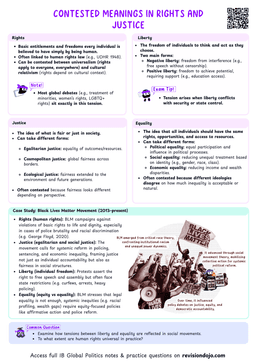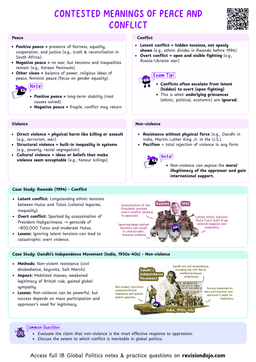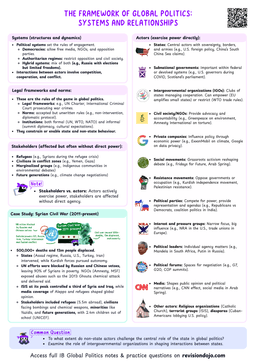Internal and External Dimensions of Sovereignty
Sovereignty
Sovereignty is a foundational concept in global politics, referring to the authority of a state to govern itself without external interference.
- Internal Sovereignty: The power of a state to govern its own territory and population.
- External Sovereignty: The recognition of a state's independence by other states and international organizations.
Internal Sovereignty
Key Features of Internal Sovereignty
- Monopoly on the Use of Force: The state has the exclusive right to use or authorize force within its territory.
- Legal Authority: The state can create and enforce laws that apply to all individuals and institutions within its borders.
- Political Autonomy: The state can make decisions on governance, economic policy, and social issues without external interference.
- The United States exercises internal sovereignty through its federal government, which has the authority to enact laws, collect taxes, and maintain a military.
Challenges to Internal Sovereignty
- Civil Conflict: Internal wars or rebellions can undermine a state's control.
- Decentralization: Federal systems may distribute power to regional governments, complicating central authority.
- Non-State Actors: Groups like multinational corporations or terrorist organizations can challenge state authority.
- The Syrian Civil War illustrates a breakdown of internal sovereignty, with the government losing control over large parts of its territory to rebel groups and external actors.
External Sovereignty
Key Features of External Sovereignty
- International Recognition: A state is acknowledged as independent by other states and international bodies.
- Territorial Integrity: Other states are expected to respect a state's borders and refrain from interference.
- Participation in International Relations: Sovereign states can enter treaties, join international organizations, and engage in diplomacy.
- The United Nations Charter enshrines the principle of external sovereignty, emphasizing non-interference in the domestic affairs of member states.
Challenges to External Sovereignty
- Globalization: Economic interdependence and international institutions can limit state autonomy.
- Humanitarian Intervention: Actions taken to prevent human rights abuses may violate traditional notions of sovereignty.
- Recognition Disputes: Some entities, like Taiwan, have limited international recognition, affecting their external sovereignty.
- The NATO intervention in Kosovo (1999) raised questions about external sovereignty, as it was conducted without United Nations approval to stop human rights violations.
The Interplay Between Internal and External Sovereignty
- Mutual Reinforcement: Strong internal sovereignty can enhance external sovereignty by ensuring stable governance and compliance with international norms.
- Tension and Conflict: External pressures, such as sanctions or military interventions, can weaken internal sovereignty.
- While internal and external sovereignty are distinct, they are deeply interconnected.
- A state's ability to maintain internal order often influences its standing in the international community.
Evolving Concepts of Sovereignty
- Responsibility to Protect (R2P): This doctrine argues that sovereignty includes a responsibility to protect citizens from mass atrocities. If a state fails, the international community may intervene.
- Shared Sovereignty: In some cases, states voluntarily cede aspects of sovereignty to supranational organizations, like the European Union, to achieve common goals.
- The European Union is an example of shared sovereignty, where member states delegate certain powers to EU institutions while retaining control over other areas.
Analyzing Sovereignty in Global Politics
- Realist Perspective: Sovereignty is a core principle, emphasizing state autonomy and non-interference.
- Liberal Perspective: Sovereignty is balanced with international cooperation and the promotion of human rights.
- Constructivist Perspective: Sovereignty is a socially constructed concept that evolves based on changing norms and values.
- Apply the liberal perspective on sovereignty to the creation of the United Nations.
- How does the UN reflect a liberal understanding of sovereignty?


